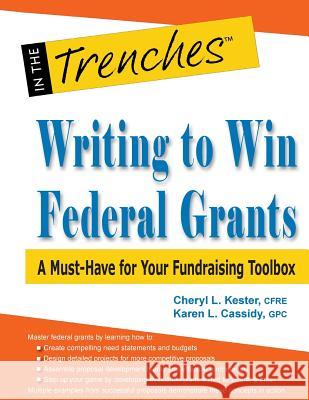Writing to Win Federal Grants: A Must-Have for Your Fundraising Toolbox » książka
Writing to Win Federal Grants: A Must-Have for Your Fundraising Toolbox
ISBN-13: 9781938077616 / Angielski / Miękka / 2015 / 244 str.
Writing to Win Federal Grants: A Must-Have for Your Fundraising Toolbox
ISBN-13: 9781938077616 / Angielski / Miękka / 2015 / 244 str.
(netto: 173,24 VAT: 5%)
Najniższa cena z 30 dni: 171,34 zł
ok. 13-18 dni roboczych.
Darmowa dostawa!
Do you want to add federal grants to your fundraising toolbox? Do you want to push past the hype and scams to what really works? Do you ever feel intimidated by complex rules for how to apply?
Writing to Win Federal Grants will help you overcome your fears and build your skills. Written in a conversational style, Writing to Win is like sitting down for your own personal workshop with the authors. Cheryl Kester and Karen Cassidy have been winning federal grants and teaching others how to do the same for a combined 35+ years. They've raised nearly $350 million from almost 40 different government agencies.
Now you can tap their knowledge and experience whenever you need it. And let's face it. We really need it when we're struggling through a challenging part of our grant that's due in three days - not when we have time to go to a workshop.
Read this book for: Tips on how to apply for the grants you have the best chance of winning Real-world examples taken straight from winning proposals A "how to do this" chapter for each major section of your proposal Checklists and worksheets that break down big tasks into workable sizes Insider tips on how to avoid losing points with your reviewers
Your time is valuable. Federal grants take a LOT of time. Don't you want to spend that time where you have the best chance of succeeding?
More than that, the skills this book will help you develop will make your foundation proposals stronger and more competitive too. Learn how to use just the right sort of data to make your case for need. Learn how to tailor your evaluation plan to the size of your project, and your budget.
This book talks frankly about working on teams, prying information you need out of co-workers, and potential ethics traps. You'll learn how to assess when it's actually better for your organization to walk away from a grant opportunity. Extensive appendices offer tips on how to become a grant reviewer, how to get registered on Grants.gov, and where to find data for putting in your proposals.
The bottom line is you can do this. The authors remind you of this over and over as they take you step-by-step through the challenges of completing your first proposal or making your fiftieth proposal even better. When you hit "submit" on that federal grant, it feels great. Kester and Cassidy show you how. Table of Contents
Chapter One: How Federal Grants Work
Chapter Two: Are We Ready for Federal Grants?
Chapter Three: Building Your Grants Dream Team
Chapter Four: Finding the Best Match: Prospect Research
Chapter Five: Deciding When to Go for It: Assessing an RFA
Chapter Six: Mapping Out Your Journey: Logic Models
Chapter Seven: Budgets and Budget Narratives
Chapter Eight: Tackling the Blank Page: How to Start Writing
Chapter Nine: Proposal Sections: Need
Chapter Ten: Proposal Sections: Project Description
Chapter Eleven: Proposal Sections: Goals and Objectives
Chapter Twelve: Proposal Sections: Organizational Capacity and Quality
Chapter Thirteen: Proposal Sections: Evaluation Plan
Chapter Fourteen: Until Grant Do Us Part?
Chapter Fifteen: Submitting Your Application
Chapter Sixteen: After the Award: Grants Management Tips











